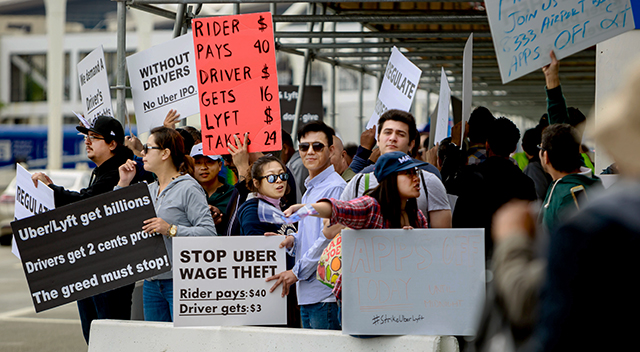Company Union 2.0: Is Organized Labor Helping to Unmake the New Deal?
By Dr. Brian Dolber

The passage of the National Labor Relations Act in 1935 not only gave workers the federally protected right to form unions and collectively bargain, it also banned employers from supporting “company unions.”
Company unions had emerged during the reactionary 1920s as part of the so-called “American Plan” to break the power of organized labor. By providing workers with some small benefits that resembled those of trade unions, while not exercising any real power, and promoting loyalty to the employer, these sham organizations would help control and contain militant, democratic movements.
Today, the need for, and potential success of such movements has never been more clear.
When rideshare giant Uber announced it would cut driver pay rates by 25 percent in Los Angeles, its second largest US market, in March 2019, members of the fledgling Rideshare Drivers United – Los Angeles, knew they had no choice but to take action. Having built a membership of 2,500 drivers over the course of one-and-half years, RDU-LA called a strike for March 25. Members picketed in front of the Uber “Greenlight Hub” office for most of the day, effectively shutting it down. Garnering favorable media coverage and the support of presidential candidates Bernie Sanders and Elizabeth Warren, their membership nearly doubled to 5,000 in the next six weeks.
So when the RDU-LA Organizing Committee voted to call a second strike on May 8, they had the ear of the media and more importantly, independent driver-organizations across the country. The strike was soon billed as a National Day of Action, and ultimately went global with protests on every continent. Two days in advance of Uber’s much-hyped IPO on the New York Stock Exchange, the strike was credited with tanking the so-called “unicorn,” and transforming the conversation around the gig economy.
But while such efforts might provide much needed momentum for revitalizing the labor movement, companies like Uber and Lyft are using legal loopholes– classifying workers as independent contractors rather than employees– to constrain worker democracy and revitalize the company union.
While the company union had been a feature of labor’s nadir, the tragedy that the historian David Montgomery termed “the fall of the House of Labor,” it re-emerges today as a farce– Company Union 2.0– developed in partnership with legitimate trade unions.
“That is a legacy no union should want.”
The Uber-funded company union “Independent Drivers Guild” (affiliated with the Machinists) in NYC is the prevailing model. Under this model, labor bureaucrats start by making backroom deals with gig company executives. Companies make minor concessions (like the ability to message drivers and deduct dues through the company app). In exchange, bureaucrats give up the right to strike, the right to collectively bargain, the right to just-cause termination, the right to fight for reclassification– the rights that workers have largely enjoyed, for 80 years.
In the California context, the Dynamex court case and the bill AB5 (Here and Here), which recently passed the Assembly, would grant gig workers all rights guaranteed to employees. This has spurred a handful of business unionists to seek exemptions for Uber/Lyft while giving established labor the right to collect dues and leaving workers with little.
Rideshare Drivers United- Los Angeles and affiliated organizations around the country, are offering an alternative to the IDG model. They have refused to take any resources from Uber and Lyft, or any labor organization that receives such support, and they are allied with the independent, militant NY Taxi Workers Alliance (NYTWA, @NYTWA). The campaign to regulate Uber & Lyft in NYC that NYTWA spearheaded, with the powerful and progressive SEIU 32BJ selflessly playing a supporting role, exemplifies the labor solidarity needed to stare down the gig Goliaths.
RDU-LA has developed a Drivers’ Bill of Rights, democratically voted on by thousands of workers through regular surveys. They want open, worker-led negotiations with the boss, not backroom deals between gig companies and labor bureaucrats. They want bargaining for the common good, helping drivers and the larger communities they service, not just for membership dues. And as they have shown, they can grow their organization by flexing a union’s most powerful muscle– the strike– rather than agreeing to contracts with no-strike clauses without a membership vote.
The demands are clear, but to meet them, gig companies will have to fundamentally alter their business models to make them more fair to workers. And the gig companies know this. That’s why they’re so eager to find willing partners in labor who will sell out drivers to the lowest bidder.
But now is not the time for workers to lower our expectations. If Uber drivers were properly classified, the company would be the largest private employer in the world, just behind the U.S. and Chinese militaries. And the need and potential for organizing rideshare drivers will only increase, as Uber’s IPO prospectus predicts drivers will experience growing dissatisfaction.
To cede this sector to capital’s business unionist partners would not only be a grave missed opportunity for those who are committed to reviving the labor movement; it would set a precedent for other sectors to reclassify workers, effectively voiding some of the most important achievements of the New Deal.
That is a legacy no union should want.
…